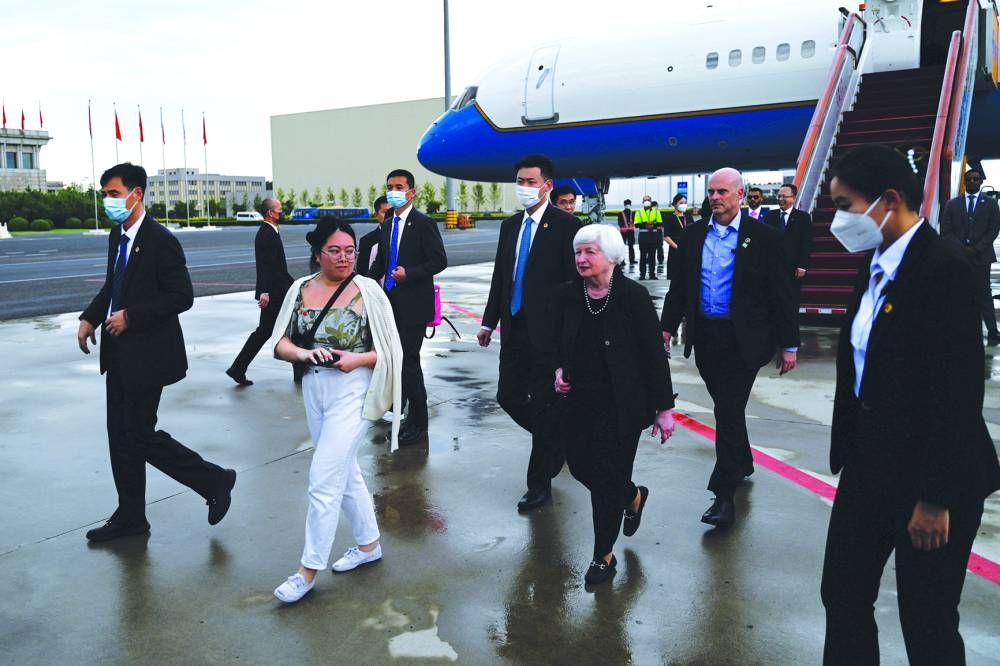US Treasury Secretary Janet Yellen on Thursday began a four-day visit to China that was expected to focus on easing ties between the world’s two largest economies, despite low expectations on both sides.
Shortly after arriving in the Chinese capital, Yellen said she was glad to be in Beijing and looked forward to advancing President Joe Biden’s goal of deepening communication between the two countries.
“We seek a healthy economic competition that benefits American workers and firms and to collaborate on global challenges,” Yellen wrote on Twitter.
“We will take action to protect our national security when needed, and this trip presents an opportunity to communicate and avoid miscommunication or misunderstanding.”
Yellen received a low-key welcome from a Chinese finance ministry official and the US envoy to China, Nicholas Burns, as she stepped off a government plane just after a rainstorm brought some relief to an otherwise sweltering Beijing.
Both sides are sceptical that Yellen’s visit will be able to take much heat out of US-China ties, however, with officials accepting that both countries have placed safeguarding national security above economic ties.
“Especially if there are things that we may disagree about, it’s even more important that we are talking,” said a US official travelling with Yellen, speaking on arrival in Beijing. “I don’t think it’s fruitless, I will say that definitively.” Yellen will address unfair practices by China, including recent punitive actions against US firms and market access barriers, the official added. She will today meet China’s Premier Li Qiang and former economy tsar Liu He, who is widely seen as a close confidant of President Xi Jinping.
Chinese commentators cry hypocrisy about US concerns over the country’s trade practices, however. “I wouldn’t regard it as Janet Yellen is not welcome, but China cannot just swallow all the poison pills and continue to show a smile,” said Wang Huiyao, the president of a think tank, the Centre for China and Globalisation, referring to US sanctions on a growing number of Chinese firms. Before Yellen’s visit, Chinese analysts told state media that her April speech, which ranked securing the national security interests of the US and its allies as the key plank of economic policy with China, did not inspire optimism.
Zhu Feng, a professor of international relations at Nanjing University, told the Global Times newspaper that Yellen’s emphasis on national security meant the US was unlikely to stop the “economic and technological suppression” of China.
Yellen will emphasise that the US does not support decoupling and call for greater transparency by China on its new espionage law, as well as progress in resolving international debt distress, the US official added.
Even though no major breakthroughs are expected, US officials say Yellen will push to open new lines of communication and co-ordination on economic matters, and stress the consequences of supplying lethal aid to Russia, an assertion China has adamantly rejected.
When Chinese ambassador Xie Feng met Yellen in Washington on Monday, he urged the US to “pay great attention” and move to tackle China’s main concerns on the economy and trade.
Trade tariffs imposed by the Trump administration and sanctions against Chinese firms are the country’s chief concerns, said Wu Xinbo, an American studies specialist at Fudan University, who is familiar with Beijing’s thinking.
Yellen’s long-anticipated trip comes weeks after a visit by Secretary of State Antony Blinken, who agreed with Chinese President Xi Jinping that the mutual rivalry should not veer into conflict, amid a freeze in talks between their militaries.

US Treasury Secretary Janet Yellen arrives at Beijing Capital International Airport in Beijing, China, on Thursday.
